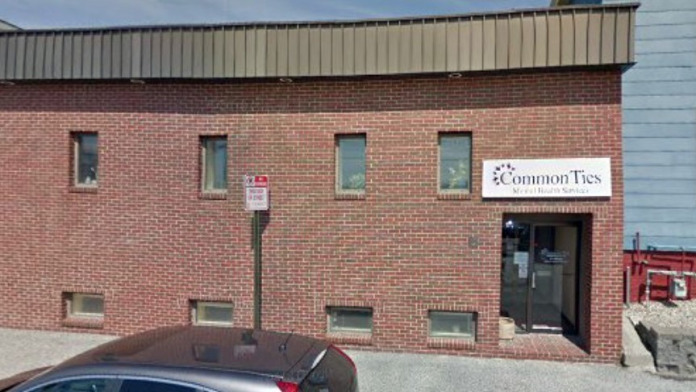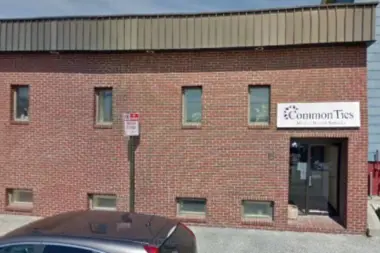The place is very ugly, you do not feel like you were going to help drugs, on the contrary, they would help you buy them.
About Common Ties Mental Health Services
Common Ties Mental Health Services is located in Lewiston, Maine, and supports individuals who are experiencing mental illness and substance use disorders. They accept referrals from a variety of sources and make treatment pretty accessible for everyone. They have plenty of services for their clients that really stood out to me, and they are all at the outpatient level of care. They offer adult case management that includes assistance with employment, education, psychiatric needs, and counseling services that can help you with your personal goals.
I like that they even help with housing resources. Their program provides support in securing stable housing if you’re in need of that, but you must be experiencing mental health issues in order to qualify for this program.
They use treatment modalities such as cognitive behavioral therapy, individual therapy and group therapy in order to help you with your conditions. They’re also gender-specific treatment and meet the needs of women, men and adolescents in different ways.
Community and Crisis Resources
They can help you connect with any community-based services in the area that can help support you and promote your overall well-being. They can also help you get access to resources that are necessary and help you foster community integration. What stood out to me, too, is that they offer crisis services that can help you with getting immediate assistance and intervention if you’re dealing with an acute mental health crisis.
Latest Reviews
Rehab Score
Gallery


Other Forms of Payment
Self-pay involves paying for treatment out of your own pocket. You can use savings or credit, get a personal loan, or receive help from family and friends to fund your treatment. If you don't have insurance or your insurance plan doesn't cover a specific program, self-pay can help ensure you still get the care you need.
Financial aid can take many forms. Centers may have grants or scholarships available to clients who meet eligibility requirements. Programs that receive SAMHSA grants may have financial aid available for those who need treatment as well. Grants and scholarships can help you pai for treatment without having to repay.
Medicaid is a state based program that helps lower-income individuals and families pay for healthcare. Medicaid covers addiction treatment so those enrolled can use their coverage to pay for rehab. When a program accepts Medicaid the client often pays very little or nothing out of their own pocket.
Medicare is a federal program that provides health insurance for those 65 and older. It also serves people under 65 with chronic and disabling health challenges. To use Medicare for addiction treatment you need to find a program that accepts Medicare and is in network with your plan. Out of pocket costs and preauthorization requirements vary, so always check with your provider.
Addiction Treatments
Levels of Care
Outpatient Programs (OP) are for those seeking mental rehab or drug rehab, but who also stay at home every night. The main difference between outpatient treatment (OP) and intensive outpatient treatment (IOP) lies in the amount of hours the patient spends at the facility. Most of the time an outpatient program is designed for someone who has completed an inpatient stay and is looking to continue their growth in recovery. Outpatient is not meant to be the starting point, it is commonly referred to as aftercare.
Clients entering inpatient rehab can expect to engage in intensive daily treatment, focusing principally on addiction counseling. Inpatient programs generally offer a range of psychotherapeutic options, including CBT, DBT, RBT, and motivational interviewing. Many also prioritize group and family counseling as well as one-on-one therapy. Many inpatient programs also include extensive addiction education and evidence-based holistic therapies, such as meditation and creative arts therapy.
Participants in 12 step programs receive ongoing peer coaching and support as they cultivate understanding, accountability, and acceptance as a condition of their recovery journey. Though 12 step recovery is rooted in the belief in a higher power as a cornerstone of sustained sobriety, religious affiliation is not required. Regular attendance at 12 step meetings is expected. These meetings are free, peer-led, and available multiple times per day, 365 days per year, in most communities.
A sober living home in Maine is typically located in a quiet neighborhood, where residents can focus on their recovery journey and personal growth. These halfway houses are typically privately owned and maintain strict rules for residents. These standards include abstinence from drug and alcohol use, participation in support group meetings and household chores, contribution to expenses such as rent, and adherence to a set curfew.
The best time for a drug intervention in Maine is when you think a loved one needs help with substance use and they are not seeking it. A drug intervention is an organized effort to confront them and share how their behavior has affected those around them. Intervention services can provide an intervention specialist to walk you through this process.
Treatments
Many of those suffering from addiction also suffer from mental or emotional illnesses like schizophrenia, bipolar disorder, depression, or anxiety disorders. Rehab and other substance abuse facilities treating those with a dual diagnosis or co-occurring disorder administer psychiatric treatment to address the person's mental health issue in addition to drug and alcohol rehabilitation.
Mental health rehabs focus on helping individuals recover from mental illnesses like bipolar disorder, clinical depression, anxiety disorders, schizophrenia, and more. Mental health professionals at these facilities are trained to understand and treat mental health issues, both in individual and group settings.
Programs
Adult rehab programs include therapies tailored to each client's specific needs, goals, and recovery progress. They are tailored to the specific challenges adult clients may face, including family and work pressures and commitments. From inpatient and residential treatment to various levels of outpatient services, there are many options available. Some facilities also help adults work through co-occurring conditions, like anxiety, that can accompany addiction.
Young adulthood can be an exciting, yet difficult, time of transition. Individuals in their late teens to mid-20s face unique stressors related to school, jobs, families, and social circles, which can lead to a rise in substance use. Rehab centers with dedicated young adult programs will include activities and amenities that cater to this age group, with an emphasis on specialized counseling, peer socialization, and ongoing aftercare.
Recovery is most successful when clients feel accepted and validated by their peers and treatment providers. Facilities that offer LGBTQ-inclusive programming are committed to creating a safe space where everyone can grow and recover without fear of judgment or discrimination. They will have dedicated policies in place to create a safe and supportive environment that fosters free expression.
Clinical Services
Cognitive Behavioral Therapy (CBT) is a therapy modality that focuses on the relationship between one's thoughts, feelings, and behaviors. It is used to establish and allow for healthy responses to thoughts and feelings (instead of unhealthy responses, like using drugs or alcohol). CBT has been proven effective for recovering addicts of all kinds, and is used to strengthen a patient's own self-awareness and ability to self-regulate. CBT allows individuals to monitor their own emotional state, become more adept at communicating with others, and manage stress without needing to engage in substance abuse.
Dialectical behavior therapy in Maine helps you challenge distorted thinking so you can develop better patterns of thoughts and behaviors. It incorporates many of the same methods as cognitive behavioral therapy, with an additional focus on intense emotions.
Group therapy is any therapeutic work that happens in a group (not one-on-one). There are a number of different group therapy modalities, including support groups, experiential therapy, psycho-education, and more. Group therapy involves treatment as well as processing interaction between group members.
In individual therapy, a patient meets one-on-one with a trained psychologist or counselor. Therapy is a pivotal part of effective substance abuse treatment, as it often covers root causes of addiction, including challenges faced by the patient in their social, family, and work/school life.
Trauma therapy addresses traumatic incidents from a client's past that are likely affecting their present-day experience. Trauma is often one of the primary triggers and potential causes of addiction, and can stem from child sexual abuse, domestic violence, having a parent with a mental illness, losing one or both parents at a young age, teenage or adult sexual assault, or any number of other factors. The purpose of trauma therapy is to allow a patient to process trauma and move through and past it, with the help of trained and compassionate mental health professionals.
To maintain long term recovery, you need to adopt a new way of life that encourages sobriety. To do this, you'll need certain life skills. That's why addiction rehab in Maine incorporates life skills training. This will equip you with the tools you need to successfully manage daily life in recovery.
Amenities
-
Residential Setting
-
Private Rooms
Staff & Accreditations
Staff
Karen Bate
Executive Director
Susan Boyce
Clinical Supervisor
Nicole Tyler
Client Services Coordinator & Billing Specialist
Wanda Griffin
Client Services Coordinator & Supervisor
Accreditations

The Commission on Accreditation of Rehabilitation Facilities (CARF) is a non-profit organization that specifically accredits rehab organizations. Founded in 1966, CARF's, mission is to help service providers like rehab facilities maintain high standards of care.
CARF Accreditation: Yes
Contact Information
12 Bates Street
Lewiston, ME 04240